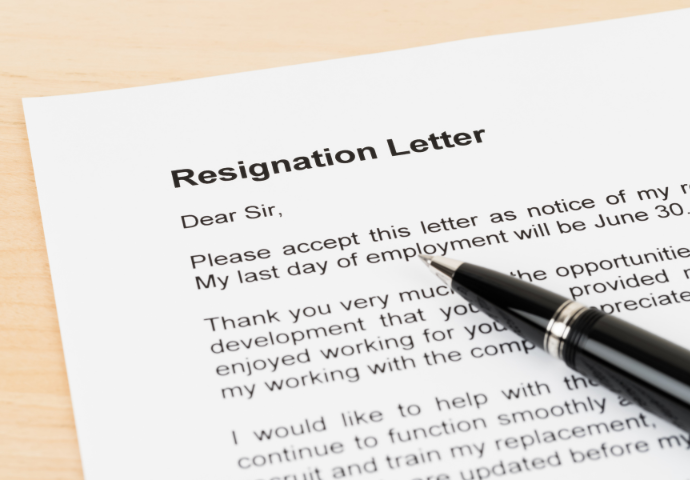At the height of the so-called Great Resignation (in the second quarter of 2021), 3.2% of employed people changed jobs. Annualised up that would be about one in eight employees.
So if your business has been around that long, the chances are you have experienced resignations in the recent past.
How did they go? Do you have your process down to a tee? Or was it a difficult experience? It depends a lot on the employee, of course; and the context of the departure. However, with a clear approach to resignations you can remove most of the emotion and drama, keep it professional and part on the best terms possible.
Putting solid HR processes in place
It is customary for a resignation to be put in writing. It avoids the heat of the moment “I quit” with the person and stands as an official record.
As employer you would then acknowledge the resignation in writing, outlining the timeline and next steps. This will be informed by your contractual notice period and what you feel is best for the company.
For example, some employers may wish to just pay them off and have them out of the door, whilst others may need them to stay to complete important work and be part of a structured handover.
However, paying them in lieu of notice can only be done if there is an express clause in their employment contract. More senior staff who leave to join a competitor may have a Garden Leave clause which, as the name suggests, keeps the person at home but unable to take up new employment for the period of leave.
Other things to get right include calculating any accrued but unused holiday pay, removing access to computer systems and taking back keys or workplace clearance cards. An invaluable tool for making sure you do all of this every time is to have a bespoke leavers checklist that covers all these points off.
Another useful HR process is to conduct a leaver’s exit interview. This will allow you to find out what their experience of working for your company was, and what their reasons were for leaving. You can use it to try to find out when your employee started looking for another job. Were they headhunted or were they looking for a long time?
It could be vital feedback to aid future retention. Of course, they may not tell you the whole truth as they will want a reference. This is why many companies use The HR Dept to carry these interviews out.
Maintaining good relations
Sometimes, on your side, there may be negative emotions to contend with: for example, you feel you have given them an opportunity and they leave you having to start over again, off to apparently bigger and better things for themselves.
It is not always possible, but it is wise to attempt to preserve good relations with your departing employee until their final day and beyond. There are several reasons for this.
Many employers will rely on an outgoing employee to do a thorough handover to the rest of the team or their replacement.
Beyond that, you never know what the future holds. Perhaps they may be available to return to work for you again, or do you a good turn from a position of power in the future.
And there are employer review sites like Glassdoor, that one must consider nowadays. An amicable ending could be the difference between getting a good review which helps with future recruitment, none at all; or worse, negative comment.
Managing the goodbye
When it comes to announcing the departure, it is sensible to get all the formalities agreed behind the scenes first – just in case there is an unexpected twist.
When and how to announce their departure to colleagues and clients is important.
If they looked after significant relationships on behalf of your business, you (or a senior colleague) will have a communications role in managing expectations – be that with suppliers or customers.
Need extra support?
If you are faced with an unexpected resignation and would like professional support in managing it, or starting the search for a replacement, why not draw on the experience of our experts? We have local offices all around the country, so get in touch today.
Image: Casper1774Studio, Getty Images via Canva



